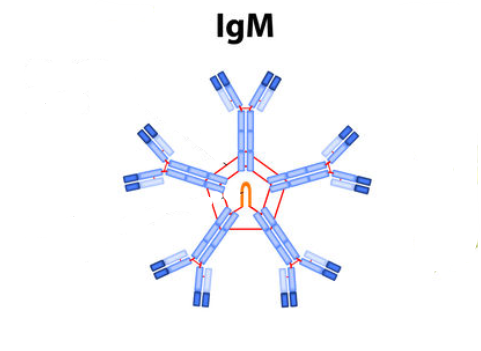Understanding Antibodies: IgM

With COVID-19 being the main point of conversation these days, and the hope for a vaccine in the future, there has been a lot of talk about antibodies. Antibodies are also a huge part of autoimmune diseases. So we thought that in the next month, we would work on breaking down the different antibodies and what each of them mean; both in relation to COVID-19 and to autoimmune diseases.
What are Antibodies and What do They Do?
Before we get on to the specific antibodies; what are antibodies to begin with? To understand that, you need to understand the complexity of the immune system. In general, the immune system has two parts to it: the innate immune system and the adaptive immune system. The innate immune system are the first responders of the immune system. These are the cells (like macrophages and dendritic cells) that recognize bacteria and viruses and alert the adaptive immune system. The innate immune system can also kill bacteria and viruses, but it is the adaptive immune system that does the most damage.
The adaptive immune system is where most of the muscle comes from. The adaptive immune system contains B cells and T cells. T cells are mainly responsible for killing things or asking the rest of the immune system for help. B cells on the other hand create antibodies. While antibodies do not specifically kill anything, they attach to things like viruses and bacteria and tell the immune system what they are. They are also responsible for sending specific signals which trigger different reactions in different parts of the body.
Types of Antibodies: IgM
There are 4 main types of antibodies: IgM, IgG, IgA and IgE. All these antibodies are responsible for different types of reactions and some are more common in certain parts of the body. Each of these antibodies will be discussed in different blog posts.
IgM antibodies are the largest of the antibodies and the first antibodies to be produced in the spleen in response to an infection. If the antibodies were the kids in the Umbrella Academy, IgM would be Number 1. (BTW, if you haven’t seen that show on Netflix, you definitely should. And don’t worry, I will continue to use this reference in future posts).
IgM antibodies are always the first to appear in the early stages of an infection. What this means, is that if you have elevated IgM antibodies to a particular bacteria, virus, or other pathogen, chances are good that you are currently infected with that organism. Or it could mean that you have been infected with that organism in the last week.
The half life of IgM antibodies is approximately 5-6 days. This means that it comes in hard and fast, starts beating things up and calling in the calvary and then heading out. (Remember Number 1 in Umbrella Academy??) So if you have had IgM antibodies elevated because of a recent infection, then chances are good they will decrease relatively quickly if that infection is cleared. But if your antibodies do not go down, that may mean the infection is still present.
Clinical Relevance of IgM
IgM antibodies have a lot of clinical relevance when understanding infection. Because they ramp up and down so quickly, they are good for understanding acute infection. They are mostly what trigger the IgG antibodies that have a much larger impact in the immune system.
For COVID-19, the antibodies that are commonly measured are the IgG antibodies. IgM antibodies are only measured by a few select labs, but they may be a good measure for seeing if there is infection in those without symptoms. COVID-19 IgM antibodies can rise within 2-3 weeks after illness onset or infection. This means that if you have IgM antibodies elevated, that you are either currently infected or have been infected in the last 2 weeks. A useful tool for possibly understanding when someone should self-quarantine.
IgM antibodies aren’t often elevated in those with autoimmune diseases unless there is an acute infection. But if there are viral or bacterial triggers that are influencing flares, they could be a helpful marker.
If you are interested in getting IgM testing for COVID-19, talk to your doctor about testing. Most of these tests can be ordered through major labs as well as specialty labs. If you have had elevated IgM antibodies, talk to your doctor about what this might mean. Or you can schedule an appt with one of our knowledgeable physicians. Next week we will go through IgG antibodies and what that means for COVID-19 and autoimmune diseases.
Looking for more information on autoimmune diseases? Get our FREE ebook The 5 Foundations of Autoimmune Diseases, register for one of our FREE online webinars, or check out our blog for additional articles.

